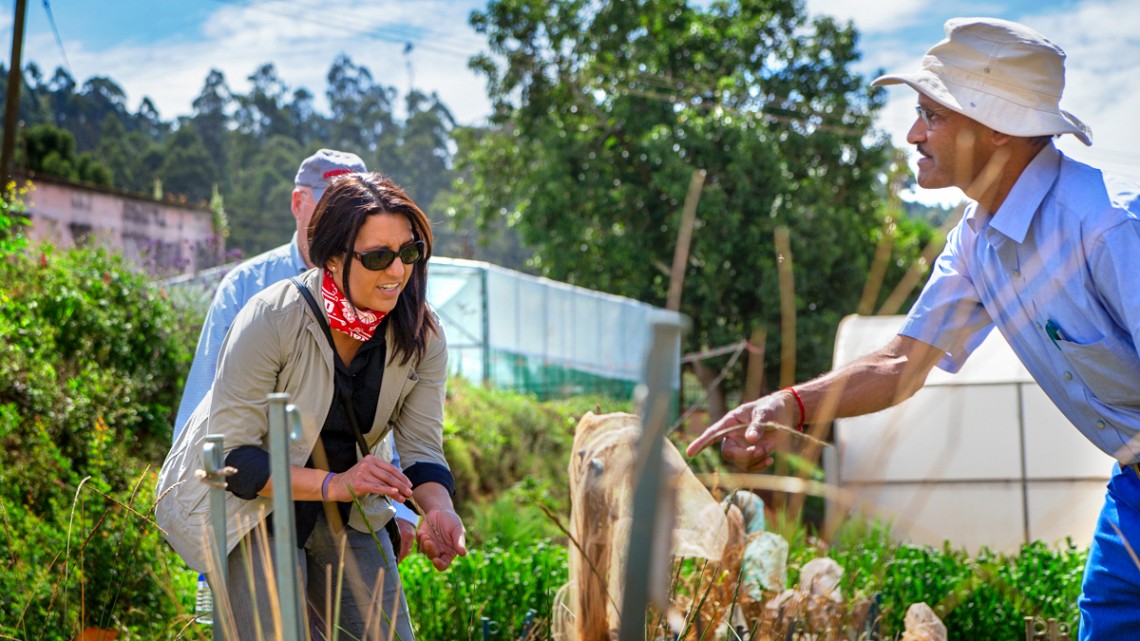
Maricelis Acevedo, left, adjunct professor in the College of Agriculture and Life Sciences, inspects wheat samples with Murugasamy Sivasamy on Aug. 29 at the Indian Agricultural Research Institute.
Deployment of plant genes critical to safeguarding wheat
By Matt Hayes
In the worst years of the rust disease epidemic that decimated North American wheat fields in the 1950s, fungal spores riding wind currents across the continent reached into the sextillions – that’s a number with 21 zeros.
Severe wheat disease epidemics produce staggering numbers of genetically diverse spores – and incalculable risks to global food supplies. If fungal spores encounter even a single susceptible wheat variety, natural selection positions the pathogen to take hold and proliferate, releasing more rounds of spores and spreading its own virulence genes across entire populations.
Wheat breeders face a daunting task trying to defend against such relentlessly evolving pathogens. In the battle, scientific ingenuity confronts biological innovation: Wheat varieties that contain single disease-resistance genes can be easily overrun by rapidly evolving spores.
To safeguard food supplies and ensure durable disease resistance in wheat, scientists must embrace a globally integrated strategy that deploys resistance genes in a coordinated way, according to Maricelis Acevedo, associate director of science for the Delivering Genetic Gain in Wheat (DGGW) project in International Programs in Cornell’s College of Agriculture and Life Sciences.
“We need to be smart about gene deployment,” Acevedo said at the All India Wheat and Barley meeting, Aug. 25 in Indore, Madhya Pradesh.
“If we don’t change our mentality,” she said, “we risk reliving the worst horrors of the past and the widespread hunger that results when rust diseases wipe out the wheat supply.”
Acevedo cautioned that the release of susceptible or vulnerable varieties at a national level weakens wheat resistance on a global scale. Varieties with only one major effective resistance gene may appear adequate to withstand disease pressure in a field trial, but are at increased risk to disease pressure when released into circulation. They also risk tainting an otherwise effective gene for other varieties, imperiling the wheat crop around the world.
Varieties with five to six disease-resistance genes make it mathematically unlikely that spores will have the genetic ability to defeat the resistance. Minnesota scientists in 1985 calculated that the odds a pathogen contains virulence to all six disease-resistance genes is more than four times greater than the actual number of spores released in a single year during a stem rust epidemic in the U.S.
To reduce the chances of selection in pathogen populations, often caused by major genes, breeders exploit combinations of genes – a strategy called “stacked genes” – that may provide partial resistance to a broader number of races.
While only releasing varieties with stacked genes is the most prudent breeding strategy, there are factors that incentivize shortcuts, according to Acevedo. Plant breeders in some countries are often promoted based on the numbers of varieties released – not for their long-term usefulness. And in some countries, there are political incentives to provide farmers with new varieties year after year rather than release fewer but more durable varieties.
Teams of plant breeders, employed by National Agricultural Research Systems in countries around the world, develop improved crop varieties. Many wheat breeders receive lines from the International Maize and Wheat Improvement Center, which national scientists then cross with local varieties to adapt to local conditions. National scientists also breed their own wheat from existing local varieties. The process of developing and releasing a new variety can take up to 10 years, and up to 15 years to make it to farmers’ fields.
The Borlaug Global Rust Initiative (BGRI) was established at Cornell to reduce the world’s vulnerability to stem, yellow and leaf rusts of wheat. Acevedo said the BGRI’s main impacts have resulted from scientific collaboration, commitment to pathogen monitoring, and development and deployment of rust-resistant varieties. The BGRI established a Gene Stewardship Award in 2012 to encourage the release of varieties with complex and diverse disease resistance.
In 2018, the Indian Council of Agricultural Research (ICAR) in New Delhi, India, and associated institutions received the BGRI Gene Stewardship Award in part for replacing susceptible wheat varieties with resistant varieties.
Those efforts have proven successful: On Aug. 24, in a report delivered at the All India Wheat and Barley meeting, ICAR announced that India for the first time produced more than 100 million tons of wheat in a year.
DGGW is funded by the Bill & Melinda Gates Foundation and by UK Aid.
Matt Hayes is associate director for communications in International Programs in the College of Agriculture and Life Sciences.
Media Contact
Get Cornell news delivered right to your inbox.
Subscribe
